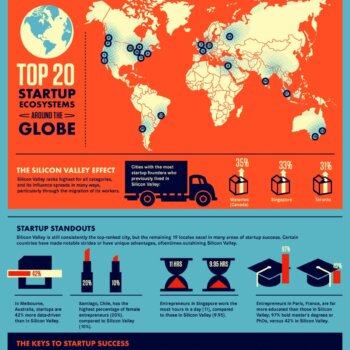Value creation is the essence of business. Value is what attracts and keeps customers. Value is what attracts and retains employees. It’s also what attracts and maintains relationships with investors, suppliers, distributors and the wide range of other stakeholders who are critical to the firm’s long-term success.
A business that does not create value will eventually fail.
How to Create Value as a Means to an End
To know how to create value in business, it’s helpful to understand what it is. It may seem a simple matter, but it is actually a topic that philosophers have debated for millennia. For many business people, value roughly translates into price, the amount someone else is willing to give us in the marketplace, in exchange for our good or service. This is the notion of “exchange value” and it is the secret sauce of supply and demand and what makes a market whir.
Economists also talk about a slightly different notion of value, which is its “use value,” or utility. Here, we’re talking about how valuable something is to me. It’s not the exchange value that you and I both agree on, but how much use I as an individual get out of particular product or service. Our different perspectives or circumstances might well result in wildly diverging valuations for the very same thing.
Use value and exchange value are critical things to get right when you’re running a business. If you don’t know how to assess the use value, or utility, of a particular technology, process, or even of a person, you are going to misunderstand how they fit into the overall value-creation process of your firm. If you don’t know how to properly assess the exchange value of your resulting goods and services, you will fail to read the market, and falter in marketing and sales.
Use value and exchange value undergird modern economics and our understanding of the way business works. They are also both examples of a broader notion of value called “instrumental value,” which is to say value, as a means to some other end. With use value, a machine or a person is as a means to create products and services. With exchange value, those products and services are a means to earning money.
If you’re getting the instrumental value of the inputs or the outputs of your business wrong, you’re probably not going to be in business over the long-haul. There is a class of businesses, however, that work with instrumental values, while also keeping an eye on another type of value.
How to Create Value as an End in Itself
While instrumental value is a means to some other end, “intrinsic value” is a fundamental consequence of something’s very existence.
Intrinsic value is not the kind of topic you find most economists spending their days contemplating. Although value investors use the term in a specific sense, the kind of intrinsic value I’m talking about is more the domain of philosophers, spiritualist, psychologists and anthropologists, musicians and artists.
Every once in a while though, you will bump into a business person who seems to operate in this field of intrinsic value creation. You tend to find them in those businesses that focus obsessively on quality or on design. You can also see their telltale marks in firms that seem to pay inordinate attention to how their products and services are actually being used by customers – not just whether those customers are satisfied with them, but whether they are successful with them.
Creating Intrinsic Value for Customers
From a customer perspective, we all know that there are some products whose value extends far beyond mere economic calculation. It might be our child’s teddy bear, our wedding ring, or a book whose message or story touched us deeply. The same is true, of course, with services. It might be an ambulance driver going above and beyond the call of duty, a sympathetic person at an airline call center during a family emergency, or a college professor who changed the direction of your life.
For these people, and in some cases, the organizations behind them, the product or service is not just a means to make money. These offerings have intrinsic value in themselves. In other words, with this rare breed of business, the object of production and the act of service create meaning through the ways in which customers interact with them.
One might say that these products and services have a certain something, a quintessence, that cuts to the essence of their value proposition, channeling a kind of invisible, intrinsic value to their users.
Every time a child hugs a teddy bear as she nods off to sleep at night, value and meaning are created. That value isn’t captured in the books of the teddy bear manufacturer, designer or retailer, but it is there, quietly accruing in thousands of little beds throughout the world, invisible to the calculations of the economist.
Creating Intrinsic Value for Employees
As important as these myriad sources of uncalculated value truly are, it still undervalues the full intrinsic value creation of most firms. This hidden component of value centers on the meaning we create through our work.
For every kid whose life takes a change for the positive as the result of some professor’s extra little bit of attention, there is a teacher who derived some sense of purpose from trying to make a difference. For every beautifully designed car, there is a team of designers who gained a wonderful sense of meaning from getting that one right. In some of these cases, there may be financial rewards associated with these employees’ extra effort, but that’s not the reason they do it. As author Dan Pink explains so wonderfully in “Drive,” they do it for reasons that go far beyond rational economic considerations. They do it for a sense of “autonomy, mastery and purpose.”
In other words, part of the reason we go the extra mile in our work centers on a type of value that goes beyond our traditional notions of economic exchange.
There is something tremendously powerful about our drive for meaning. When we find meaning in our work, it can act as a powerful aphrodisiac, an injection of inspiration capable of getting us through the most trying of times. It might be the firefighter who has seen her work translated into a saved life. It might be an engineer whose solar panel design single-handedly resorts in the reduction of millions of pounds of carbon that might otherwise be dumped into our atmosphere. Or it might be that teacher who has seen the effect his connections with students can have on the long-term direction of their lives.
For these people, work is not simply a means to a paycheck. For these people, work creates value through helping them to create meaning of their lives. It is what enables them to be of service to the world and the company’s that offer this type of work create a powerful attractor for the best and brightest employees.
Meaning, Mission and Value Creation in Business
Businesses that know how to engage this quintessential quality of intrinsic value creation have a huge advantage over firms that wield purely instrumental notions of value creation.
Firms that create intrinsic value through meaning face a kind of paradox. That meaning and purpose, that desire to serve a mission, is what creates economic value for the firm. It’s what brings people to work and what draws customers in. No mission, no money. And yet, missions are ultimately dependent upon the firm’s ability to generate revenues. No money, no mission.
Managing this paradox of value creation requires that firms get a much deeper understanding of the nature of the value they create – both value as a means to money and as an end in itself. Businesses that know how to master the tension between instrumental and intrinsic value creation are businesses that know how to translate meaning into money.
These are the truly great mission-driven companies, the ones that attract and engage us the deepest.
______________________________________________________
About the Author
This article was written by Gideon Rosenblatt of The Vital Edge. Gideon ran an innovative social enterprise called Groundwire for nine years. He worked at Microsoft for ten years in marketing and product development, and created CarPoint, one of the world’s first large-scale e-commerce websites in 1996. The Vital Edge explores the human experience in an era of machine intelligence.





























